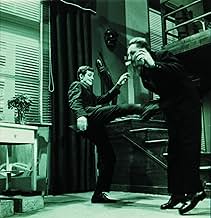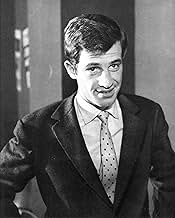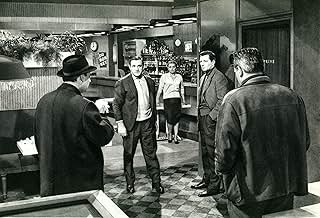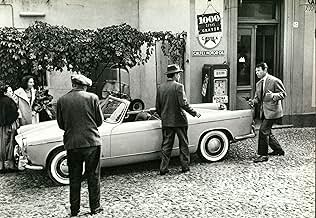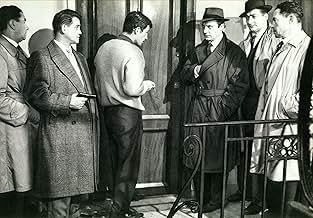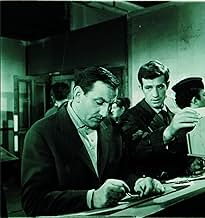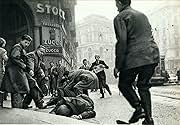IMDb RATING
7.5/10
4.8K
YOUR RATING
A ruthless criminal flees from the pursuit, involving more and more casualties.A ruthless criminal flees from the pursuit, involving more and more casualties.A ruthless criminal flees from the pursuit, involving more and more casualties.
Simone Desmaison
- Thérèse Davos
- (as Simone France)
Jean-Pierre Zola
- Le patron de l'agence privée
- (as J.P. Zola)
Philippe March
- Jean Martin
- (as Aimé de March)
Featured reviews
"Classe tous risques" feels like the granddaddy of "The Sopranos" in mixing the criminal and the domestic, and of the buddy film to feel as contemporary as "Reservoir Dogs."
Even as these gangsters are affectionately entangled with wives, children, lovers and parents, they are coldly ruthless, and we are constantly reminded they are, no matter what warm situation we also see them in. They can tousle a kid's hair - and then shoot a threat in cold blood. The key is loyalty, and the male camaraderie is beautifully conveyed, without ethnic or class stereotypes, even as their web of past obligations and pay backs narrows into suspicion and paranoia, as the old gang is in various stages of parole, retirement, out on bail or into new, less profitable ventures. An intense accusation is of sending a stranger to perform an old escape scenario. It is a high point of emotion when a wife is told off that she's not the one the gangster is friends with, while virtually the only time we hear music on the soundtrack is when he recalls his wife.
Streetscapes in Italy and France are marvelously used, in blinding daylight to dark water and highways, from the opening set up of a pair of brazen robbers -- who are traveling with one's wife and two kids. Rugged, craggy Lino Ventura captures the screen immediately as the criminal dad. And the second thug is clearly a casually avuncular presence in their lives, as they smoothly coordinate the theft and escape, in cars, buses, on boats and motorcycles, in easy tandem. This is not the cliché crusty old guy softened with the big-eyed orphan; these are their jobs and their families and they intersect in horrific ways.
The film pulls no punches in unexpectedly killing off characters, directly and as collateral damage, and challenging our sympathy for them, right through to the unsentimental end, which is probably why there was never an American remake.
It seems so fresh that it's not until Jean-Paul Belmondo enters almost a third of the way into the film, looking so insouciant as a young punk, that one realizes that this is from 1960. Sultry Sandra Milo has smart and terrific chemistry with him, from an ambulance to an elevator to a hospital bed.
While the Film Forum was showing a new 35 mm print with newly translated subtitles, it was not pristine. The program notes explained that the title refers to a kind of insurance policy and is pun on "tourist class."
Even as these gangsters are affectionately entangled with wives, children, lovers and parents, they are coldly ruthless, and we are constantly reminded they are, no matter what warm situation we also see them in. They can tousle a kid's hair - and then shoot a threat in cold blood. The key is loyalty, and the male camaraderie is beautifully conveyed, without ethnic or class stereotypes, even as their web of past obligations and pay backs narrows into suspicion and paranoia, as the old gang is in various stages of parole, retirement, out on bail or into new, less profitable ventures. An intense accusation is of sending a stranger to perform an old escape scenario. It is a high point of emotion when a wife is told off that she's not the one the gangster is friends with, while virtually the only time we hear music on the soundtrack is when he recalls his wife.
Streetscapes in Italy and France are marvelously used, in blinding daylight to dark water and highways, from the opening set up of a pair of brazen robbers -- who are traveling with one's wife and two kids. Rugged, craggy Lino Ventura captures the screen immediately as the criminal dad. And the second thug is clearly a casually avuncular presence in their lives, as they smoothly coordinate the theft and escape, in cars, buses, on boats and motorcycles, in easy tandem. This is not the cliché crusty old guy softened with the big-eyed orphan; these are their jobs and their families and they intersect in horrific ways.
The film pulls no punches in unexpectedly killing off characters, directly and as collateral damage, and challenging our sympathy for them, right through to the unsentimental end, which is probably why there was never an American remake.
It seems so fresh that it's not until Jean-Paul Belmondo enters almost a third of the way into the film, looking so insouciant as a young punk, that one realizes that this is from 1960. Sultry Sandra Milo has smart and terrific chemistry with him, from an ambulance to an elevator to a hospital bed.
While the Film Forum was showing a new 35 mm print with newly translated subtitles, it was not pristine. The program notes explained that the title refers to a kind of insurance policy and is pun on "tourist class."
The film Classe tous risques directed by Claude Sautet was not a film, to be honest, I had ever really heard of until the Film Forum in NYC said that they would have a 2-week screening of the film, with new English subtitles. When I also read that it was in the vein of the classic French crime films ala Jean Pierre Melville, I jumped at the chance to check it out (at best it would rank up with his great works, and at worst I would get some good popcorn in a great theater). It was well worth the admission, as Classe tous risques is one of those kinds of French films that is just waiting to be re-discovered (or discovered for the first time). With terrific, tense diligence, Sautet keeps the suspense at a tight pitch for the first forty minutes of the film, keeping a good (if not great) middle section, and then ending it up with what is always expected with these films, but with fascinating motivations by way of the characters. With a film in the vein of this sort, you know how it will end, but it's the cool, observant journey that counts.
The film features a performance with some real truth and honesty, amid the "old-school" criminal's code, by Lino Ventura as Aldo, who at the start of the film (one of the best beginnings to a film in this genre and country) steals a hefty amount of money with his partner in crime). When there is a sudden, ugly twist of fate on a beach late one night, Aldo is again on the run with two little kids. He gets the aid of Eric Stark (Jean-Paul Belmondo, a role in tune with Le Doulos only with a smidgen more humanity and charisma), who is also a thief and drives him into Paris. But there are some problems with some of Aldo's old business partner's, and one old score may be just the right ticket. A couple of times the plot may seem to be leisurely, but it isn't. Like Melville, Sautet doesn't allow any fat to his story, and it's a very tightly structured film, with some good doses of humor here and there (I was sometimes grinning at the audacity of the criminals in the beginning chase sequence, and also with a particular woman who had a finicky thing with her cat and a fish).
Along with a fine score by the great George Delerue, exceptional cinematography, and a mood that is seldom met let alone matched now adays, Classe tous risques is a reminder of that bridge between the real old-school film-noir, and the latter day crime films. Gangsters in these new sort of "thug-life" movies have a 1000th of the class and honor of the thieves in this film, and is a second banana to the works of Melville and Jules Dassin (a compliment I assure you). That it has a good realistic, moral edge helps as well.
The film features a performance with some real truth and honesty, amid the "old-school" criminal's code, by Lino Ventura as Aldo, who at the start of the film (one of the best beginnings to a film in this genre and country) steals a hefty amount of money with his partner in crime). When there is a sudden, ugly twist of fate on a beach late one night, Aldo is again on the run with two little kids. He gets the aid of Eric Stark (Jean-Paul Belmondo, a role in tune with Le Doulos only with a smidgen more humanity and charisma), who is also a thief and drives him into Paris. But there are some problems with some of Aldo's old business partner's, and one old score may be just the right ticket. A couple of times the plot may seem to be leisurely, but it isn't. Like Melville, Sautet doesn't allow any fat to his story, and it's a very tightly structured film, with some good doses of humor here and there (I was sometimes grinning at the audacity of the criminals in the beginning chase sequence, and also with a particular woman who had a finicky thing with her cat and a fish).
Along with a fine score by the great George Delerue, exceptional cinematography, and a mood that is seldom met let alone matched now adays, Classe tous risques is a reminder of that bridge between the real old-school film-noir, and the latter day crime films. Gangsters in these new sort of "thug-life" movies have a 1000th of the class and honor of the thieves in this film, and is a second banana to the works of Melville and Jules Dassin (a compliment I assure you). That it has a good realistic, moral edge helps as well.
In Milan, the gangster Abel Davos (Lino Ventura) is sentenced to death "In absentia" and decides to return to France. Abel is a family man with wife Thérèse Davos (Simone France) and two sons, and his partner Raymond Naldi (Stan Krol) helps Abel and his family to flee to Nice. However Thérèse and Raymond are killed by the police and Abel uses his former friends in Paris to help him to go to Paris with his sons. They hire the driver Eric Stark (Jean-Paul Belmondo) to bring Abel and his kids to Paris in an ambulance. Along their journey, Eric helps the aspirant actress Liliane (Sandra Milo) on the road and she also goes to Paris in the ambulance. But soon Abel learns that he is alone and his friends when he was powerful will not help him and he counts only with the support of Eric. What will happen to him?
"Classe tous risques" is a great film-noir with the story of the last days of a gangster. The plot shows that there is no code of honor or friendship after the fall of a powerful gangster. All his former friends do not help him when he needs. The conclusion is adequate for the whole situation. My vote is eight.
Title (Brazil):"Como Fera Encurralada" ("Like Trapped Beast")
"Classe tous risques" is a great film-noir with the story of the last days of a gangster. The plot shows that there is no code of honor or friendship after the fall of a powerful gangster. All his former friends do not help him when he needs. The conclusion is adequate for the whole situation. My vote is eight.
Title (Brazil):"Como Fera Encurralada" ("Like Trapped Beast")
A discovery. Made in 1960, at the peak of the French New Wave, 'Classe Tous Risques' is a classic gangsters movie, directed by Claude Sautet, the screen adaptation of a novel by José Giovanni. Like many other filmmakers who began their careers during the New French Wave, Sautet and Giovanni, even though they did not belong to the current, became known both as directors and screenwriters of many films of this genre, a genre which a few years later will draw the attention of some of the most famous directors of the New Wave such as Melville or Chabrol. The film brings together on the same screen two of the actors specializing in tough guys roles in French films noir. Lino Ventura was already a well-known actor, while Jean-Paul Belmondo was building up his fame and full of creative hunger. In that year 1960 his name appeared on the credits of no less than eight films. The presence of Ventura and Belmondo, who on the screen as in reality played the roles of master and disciple is just one of the arguments that make 'Classe Tous Risques' a film worth seeing 60 years after its premiere.
Many films had already been made about the 'code of honor' of the underworld, and more would follow. Let's put aside the moral judgments about the 'honor' of those who rob, kill each other or kill innocent people in cold blood, but otherwise they are good familist and people capable of falling in love. Let's admit that the theme is an excellent starting point or core subject for thriller novels and films noir. This is also the case with the story of gangster Abel Davos (Lino Ventura), sentenced to death and pursued by all police of Europe, whose wife is killed when they try to return to France, who is betrayed by his old friends in crime and thus left to fight for survival with his two 8- and 4-year-old boys in her care. The help comes from Eric Stark (Jean-Paul Belmondo), a young gangster in the making, for whom Davos was kind of a moral model, precisely because of his respect for the mob codes of honor. The connection between the two (friendship, master - disciple) is the axis of the film.
Lino Ventura acts wonderfully in a type of role in which he specialized in those years, the tough guy followed by everyone who carries a gun, and whose chances of surviving until 'Fin' appears on the screen are low. He is however surpassed, I believe, in this film by Jean-Paul Belmondo, who manages to give a positive touch to his role, with the help of Sandra Milo as the young actress with whom Eric begins a relationship that may be his chance not to repeat the fate of Abel . The filming has rhythm and fluency, the characters are believable and the action flows interestingly until the final part, which confronts us with a less common ending for films of this genre, perhaps inspired by docu-novels that were also in vogue in those years. It's worth, I think, to see the movie and get to the end to judge by yourselves.
Many films had already been made about the 'code of honor' of the underworld, and more would follow. Let's put aside the moral judgments about the 'honor' of those who rob, kill each other or kill innocent people in cold blood, but otherwise they are good familist and people capable of falling in love. Let's admit that the theme is an excellent starting point or core subject for thriller novels and films noir. This is also the case with the story of gangster Abel Davos (Lino Ventura), sentenced to death and pursued by all police of Europe, whose wife is killed when they try to return to France, who is betrayed by his old friends in crime and thus left to fight for survival with his two 8- and 4-year-old boys in her care. The help comes from Eric Stark (Jean-Paul Belmondo), a young gangster in the making, for whom Davos was kind of a moral model, precisely because of his respect for the mob codes of honor. The connection between the two (friendship, master - disciple) is the axis of the film.
Lino Ventura acts wonderfully in a type of role in which he specialized in those years, the tough guy followed by everyone who carries a gun, and whose chances of surviving until 'Fin' appears on the screen are low. He is however surpassed, I believe, in this film by Jean-Paul Belmondo, who manages to give a positive touch to his role, with the help of Sandra Milo as the young actress with whom Eric begins a relationship that may be his chance not to repeat the fate of Abel . The filming has rhythm and fluency, the characters are believable and the action flows interestingly until the final part, which confronts us with a less common ending for films of this genre, perhaps inspired by docu-novels that were also in vogue in those years. It's worth, I think, to see the movie and get to the end to judge by yourselves.
Both Bresson and Melville are reputed to be big fans of "Classe Tous Risques" and it's easy to see why; either man could have directed this classic French gangster picture. The actual director was Claude Sautet and it's one of the greatest second films in movie history, (in the 15 year period between 1956 and 1970 Sautet made only 4 films). He made this one in 1960 around the time of the New Wave and while it's more traditional than something Godard or Truffaut might have done, nevertheless Sautet brings to it a freshness of approach that other gangster pictures of the period seem to lack. From the absolutely stunning opening sequence it's clear that this film will be infused with a good dose of existential angst as well as the requisite thrills that a really good gangster movie needs.
Two fugitives, (Lino Ventura and Stan Krol), have decided it's time to get out of Italy and back to France as the net closes in around them but they need money. They commit a foolhardy, though daring, daylight robbery and go on the run. This opening and the chase that follows is as good as anything in crime movies. The money they make, however, is hardly enough to sustain them, (Ventura has a wife and two sons to support), so they must rely on a network of friends and criminal associates and men on the run, already operating on the very edge, need all the friends they can get, however untrustworthy they may be and these guys friends prove to be very untrustworthy indeed but when tragedy strikes Ventura seems to have no option.
With the possible exceptions of Dassin's "Rififi" and several of Jean-Pierre Melville's classic gangster pictures this remains one of the greatest of genre films and is all the better for being, fundamentally, a low-key character piece. Ventura is perfect as the world-weary thief who would really rather just settle down and raise his family and he is matched by a young Jean-Paul Belmondo as the stranger who becomes his only real friend and ally. The brilliant black and white cinematography is by Ghislain Cloquet, (it was shot largely on location), and it is beautifully adapted by Sautet, Pascal Jardin and Jose Giovanni from Giovanni's novel.
Two fugitives, (Lino Ventura and Stan Krol), have decided it's time to get out of Italy and back to France as the net closes in around them but they need money. They commit a foolhardy, though daring, daylight robbery and go on the run. This opening and the chase that follows is as good as anything in crime movies. The money they make, however, is hardly enough to sustain them, (Ventura has a wife and two sons to support), so they must rely on a network of friends and criminal associates and men on the run, already operating on the very edge, need all the friends they can get, however untrustworthy they may be and these guys friends prove to be very untrustworthy indeed but when tragedy strikes Ventura seems to have no option.
With the possible exceptions of Dassin's "Rififi" and several of Jean-Pierre Melville's classic gangster pictures this remains one of the greatest of genre films and is all the better for being, fundamentally, a low-key character piece. Ventura is perfect as the world-weary thief who would really rather just settle down and raise his family and he is matched by a young Jean-Paul Belmondo as the stranger who becomes his only real friend and ally. The brilliant black and white cinematography is by Ghislain Cloquet, (it was shot largely on location), and it is beautifully adapted by Sautet, Pascal Jardin and Jose Giovanni from Giovanni's novel.
Did you know
- TriviaCo-writer/Director Claude Sautet said after the shooting that he did not know that the Abel Davos - Danos - character was inspired by a gangster who collaborated with the Nazis against French resistance and Jews during German occupation.
- Quotes
Eric Stark: The best thing about me is my left hook.
- ConnectionsFeatured in Claude Sautet ou La magie invisible (2003)
- How long is The Big Risk?Powered by Alexa
Details
Box office
- Gross US & Canada
- $132,928
- Opening weekend US & Canada
- $11,945
- Nov 20, 2005
- Gross worldwide
- $132,928
- Runtime
- 1h 43m(103 min)
- Color
- Aspect ratio
- 1.66 : 1
Contribute to this page
Suggest an edit or add missing content




